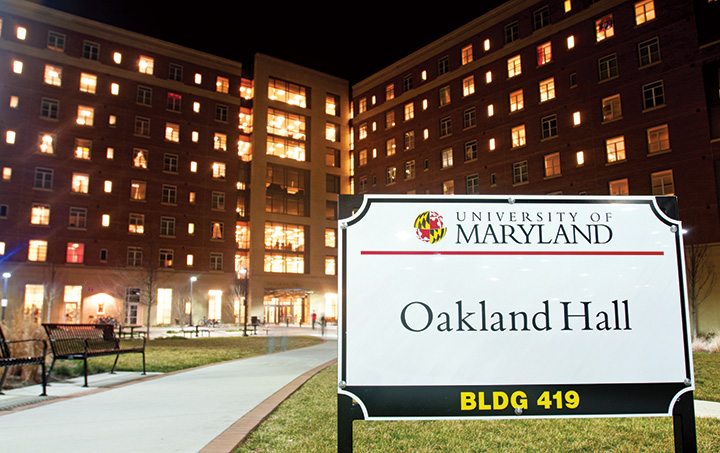
Oakland Hall, along with Cambridge Community dorms and some semi-suites, suites and apartments, will feature gender-inclusive rooms with private bathrooms next fall under a one-year pilot program.
The Department of Resident Life will embark on a one-year pilot program to provide more gender-inclusive and mixed-gender housing options next fall, after a unanimous vote by the Residence Hall Association senate Tuesday night.
The pilot calls for around 50 to 75 beds to serve as gender-inclusive rooms — in which students can share the same living space regardless of sex, gender or gender identity. In addition, the university will increase its mixed-gender housing — in which halls alternate rooms for men and women — to 350 to 375 beds, accounting for about 4 percent of spaces on the campus.
Cambridge Community dorms, Oakland Hall and some semi-suites, suites and apartments will feature gender-inclusive rooms with private bathrooms, which could include private toilet stalls and showers with more changing room for privacy. Cambridge Community will also offer some mixed-gender floors, and Resident Life officials are still in the process of negotiating whether to expand that format to other locations on North Hill.
“We’re creating another option for students; we’re not really taking any options away,” said Amy Martin, Resident Life’s associate director. “This is a pretty narrow start and our longer-term goals involve a lot of different options.”
The expanded housing options will serve as a definite support to members of the LGBT community — in particular, students in the middle of their transition from one gender to another — said Luke Jensen, the LGBT Equity Center’s director.
“I really applaud Resident Life and RHA for taking this step. … Everyone needs to have a place where it’s safe and comfortable, a place where they really feel at home,” Jensen said. “If you look at what other universities are doing, you almost want to say, ‘Why haven’t we been doing this already?’”
Martin presented the pilot program to RHA last month, hoping to answer any questions about either option, as well as to provide the results of a survey conducted last spring that helped her team craft its plans moving forward.
In the survey, Resident Life officials questioned students on their general preferences for the housing options available next fall — single-gender, mixed-gender and gender-inclusive housing. In the results, 49 percent of respondents would choose to live in mixed-gender halls, 23 percent in gender-inclusive rooms and 28 percent in single-gender halls.
In addition, 76 percent of respondents said they would be comfortable walking past rooms with members of a different gender to get to the bathroom, which may occur in a mixed-gender housing environment. Ninety percent of students said they would be comfortable sharing a living room and kitchen with anyone they lived with, regardless of their gender. Still, half of respondents said they would only be comfortable sharing a community bathroom in a traditional hall with someone of the same gender.
Students responded they would not be considering gender-inclusive housing for several reasons, including feeling they would have less privacy (50 percent) or would be uncomfortable (31 percent), or the option would conflict with personal values (18 percent).
“It’s nice to have that opportunity to live with other genders if you want,” said senior biology major Atoussa Halary. “I don’t think it should be enforced, especially because of religious reasons.”
While Resident Life works to craft a more inclusive campus, members noted gender-separate halls will always be available. In addition, Martin plans to reevaluate the success of the newly appropriated rooms with RHA’s help by this time next year.
“We may expand beyond Cambridge Community and North Hill in following years,” Martin added. “For next year, we’re trying to make sure we’re not doing too much too fast.”
The body has made preliminary plans for the second year of the program. Resident Life officials want to look into options with living-learning programs on the campus and Prince Frederick Hall. Officials hope to provide these options to freshmen entering the campus in fall 2014.
“The more living options, the better,” senior English language and literature and sociology major Rebecca Krevat said. “I hope it does work out.”
By enacting this pilot program, the university will be one of four University System of Maryland schools working to providing more living options. Towson, Frostburg and the University of Maryland, Baltimore County have also been working since 2007 to expand gender-inclusive housing.
“The fact that it is going to be a pilot program is really good to test the waters and see how it goes,” RHA President Sasha Azar said at Tuesday’s meeting. “It is a significant vote, and I think our senators handled it really well. They did a really good job with keeping an open mind and really trying to envision how this will look on campus.”



